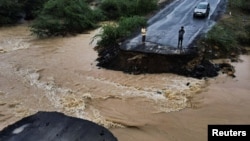Preliminary data gathered by climate scientists suggest that the first week of July was the planet's hottest week on record, with blazing temperatures around the globe and ocean temperatures in some regions "much higher" than climate change models had predicted.
On July 7, the hottest single day ever recorded up to that point, the average global surface temperature was 17.24 degrees Celsius, 0.3 degrees above the previous record of 16.94 degrees set in August 2016, according to the World Meteorological Organization.
Scientists were particularly alarmed because the high temperatures occurred in advance of the establishment of the El Niño weather pattern in the Pacific, which is expected to elevate global temperatures later this year and into 2024.
"The exceptional warmth in June and at the start of July occurred at the onset of the development of El Niño, which is expected to further fuel the heat both on land and in the oceans and lead to more extreme temperatures and marine heatwaves," Christopher Hewitt, WMO director of climate services, said in a statement.
"We are in uncharted territory and we can expect more records to fall as El Niño develops further and these impacts will extend into 2024," Hewitt said. "This is worrying news for the planet."
Widespread impact
The WMO report follows an equally dire analysis from the European Union's Copernicus Climate Change Service, which found the month of June to be the single hottest month ever recorded.
The impact was felt all around the globe, with higher than normal temperatures recorded in Canada, the United States, Mexico, Asia and eastern Australia.
In addition to higher temperatures, climate change is causing more severe weather patterns. Multiple regions around the world experienced significantly drier than usual weather in June, including central and eastern Europe, Scandinavia, Russia, the Horn of Africa, much of southern Africa, South America and parts of Australia, which all saw lower than average rainfall. Parts of North America were also drier than usual, which has contributed to massive wildfires, particularly in Canada.
At the same time, multiple areas experienced significantly higher levels of precipitation than expected, including western North America, parts of southwestern Asia, Japan, South Africa, Brazil, Chile, New Zealand and part of Australia. Japan experienced typhoon Mawar, and Pakistan was hit by cyclone Biparjoy. In southern Europe and parts of western Russia, higher than expected precipitation caused significant flooding.
Ocean temperatures concerning
Climate scientists were particularly concerned by an unexpectedly large rise in ocean temperatures, particularly in the North Atlantic.
"The temperatures in the North Atlantic are unprecedented and of great concern," Michael Sparrow, head of WMO's World Climate Research Division, said in a statement. "They are much higher than anything the models predicted. This will have a knock on effect on ecosystems and fisheries and on our weather."
Higher temperatures in the North Atlantic have widespread consequences, driving extreme tropical weather, including the hurricanes that regularly ravage the eastern United States, and dramatically affecting rainfall across western Africa.
Scientists also noted dramatic reductions in sea ice in the Antarctic, which reached its lowest level since satellite monitoring of its extent began. Measurements found that there were 2.6 million fewer square kilometers of Antarctic ice than average, more than twice the decline measured in 2022, which had been the worst year on record.
Environmental groups concerned
"Climate scientists have warned for decades that human-induced climate change will warm the planet to unprecedented levels and cause irreversible changes in the environment," Fiona Lo, a climate scientist with the Environmental Defense Fund, told VOA in an emailed statement.
"The WMO report of the hottest week on record is just one of many disheartening confirmations," Lo said. "My hope is that these extreme weather events will awaken the world to the reality of the climate crisis, so that we can work together to reduce further warming."
However, Lo said, the WMO's finding of "off the charts" sea temperature levels might not be as surprising as it seems.
"Climate models are very good at predicting how average conditions will change over years and decades but are not good at predicting extreme variability in the near term, so it's not surprising that the observations of ocean temperatures over such a short period are much higher than model predictions," she said.
Anusha Narayanan, global project lead at Greenpeace USA, told VOA that the report should be a call to action for governments around the world.
"Last week was the world's hottest on record. We are currently in the worst megadrought in 1,000 years. It is no longer a question of if climate change is happening, but a question of how bad we let it get," Narayanan said.
"The alarm bells are ringing and our planet is telling us that we need to act now. President Biden and global leaders are simply not meeting the urgency of the crisis. We know pollution from oil and gas is worsening the climate crisis, yet our leaders continue to be fooled by the false choice between a healthy economy and a healthy planet. We will have neither if we continue to delay a transition to renewable energy."








